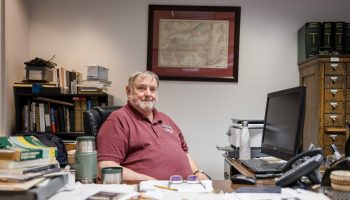
Kaitlyn Finchler
Contributing writer
Omid Safi, professor of Islamic studies at Duke University, will share his takes on best meditative practices in his lecture “After Meditation … What Now?” at 2 p.m. today in the Hall of Philosophy for the Week Three Interfaith Lecture Series theme “Contemplation: Meditation, Prayer and Silence.”
“I’m trying to make the case that it’s really about softening the boundaries between our self and nature, and softening the boundaries between our self and God,” Safi said, “so that other than the self being at the center of the world, it’s really existence, reality, God, who is at the center.”
Describing meditation as a way of “removing the ego,” Safi said he will discuss ancient breathing techniques to soften the boundary between self and nature. He said he also wants to show Chautauquans how being contemplative can be done more efficiently and having a “happier self-understanding.”
“Find practices or places where you feel your soul being rejuvenated,” he said. “For some, it may look like going for a walk in nature. For some, it might be a conversation with a close friend (and) for some, it might look like a form of ritual prayer or yoga, and then, to do it and do it and do it again until it becomes a habit.”
This practice calls for a measure of self-understanding, of being in “touch with our own true self,” Safi said.
The last practice is recognizing the presence of the luminous, or God, that people come across, he said, which is another way of “softening the boundaries between yourself and others.”
“There’s a lot of discussions and realities, even, about the way that there’s a ‘me first’ approach dominating a lot of the world,” Safi said. “We see the very devastating consequences of it in terms of racial relations, national tensions, even international crises. The more we can cultivate a sense that ‘none of us can do well until we all do well,’ I think that’s likely to have a profound impact on our ability to live together.”
Adding more to his point of the “me first” approach, Safi said, “we live in an age where individually, collectively and nationally, the ego is on full blast.”
Bringing different faiths together to practice these mindsets will not be done by having “one nation or one race or one religion” establish supremacy over others, Safi said. He compared it to global politics: if the United States wants to be first, as well as the Russians and the Chinese, it’s “just a recipe for a global conflict.”
“The model of this interwoven, interconnected life is a sense of collective thriving,” Safi said, “where for me to do well doesn’t have to come at your expense and vice versa, but we can only get there if we can rise above this model of supremacy.”
Safi said he hopes Chautauquans will hold up these teachings and examine their own lives, even going so far as to ask themselves if they have practices that rejuvenate them.
“(I want people to have) some recognition that this contemplative life is not simply a matter of being — as it were — more religious,” he said. “It’s also a question of ‘How? What kind of religion? Is it a life that is based on sitting with a cosmic mystery that’s grander than any of us?’ ’’




